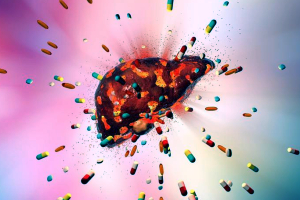Drug Induced Liver Injury
Drug-induced liver injury (DILI) is a condition in which the liver is damaged by medications, chemicals, or herbal supplements. It can occur when a drug is metabolized in the liver and produces toxic byproducts that damage liver cells, or when the immune system mistakenly attacks the liver tissue in response to the drug.
DILI can range from mild, reversible liver damage to severe, life-threatening liver failure. Symptoms of DILI may include fatigue, abdominal pain, jaundice, nausea, vomiting, and loss of appetite. In some cases, DILI may not cause any symptoms at all.

Diagnosis of DILI involves a thorough medical history, physical exam, blood tests to assess liver function and rule out other causes of liver disease, and imaging tests such as ultrasound or MRI. A liver biopsy may also be performed to confirm the diagnosis and assess the degree of liver damage.
Treatment for DILI involves discontinuing the medication or toxin that caused the liver injury, managing symptoms, and providing supportive care as needed. In severe cases, hospitalization may be necessary, and in rare cases, liver transplantation may be required if the liver damage is severe and irreversible.
